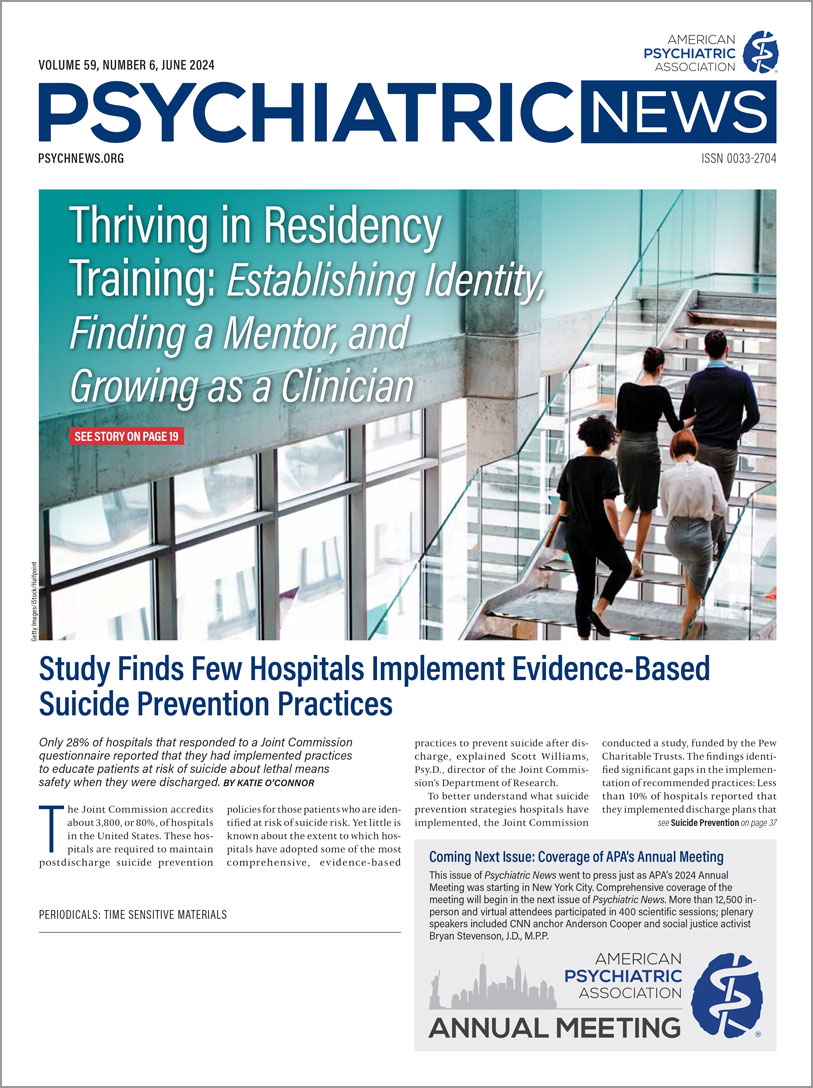Psychiatry and the Genome: Predicting the Future
Now that the human genome has been published in Nature and Science for all the world to see, how will this information affect psychiatry over the next five to 10 years? Two physician-geneticists gave some answers at a recent media briefing sponsored by the Genetic Alliance, a coalition of patient advocacy groups, at the New York Academy of Sciences in New York City. Their answers constituted essentially two predictions.
One prediction is that a handful of bipolar genes will probably be identified. Another is that “pharmacogenetics”—the ability to determine, on the basis of genes or markers for genes, which patients will respond to which medications and which patients will develop toxicity from which medications—will no longer be just a construct, but reality.
The first forecast came from J. Raymond DePaulo Jr., M.D., a professor of psychiatry at Johns Hopkins University School of Medicine in Baltimore. He is a specialist in depression and bipolar disorder and a researcher in genetics.
The second forecast also came from him and Allen Roses, M.D., senior vice president of genetics research at GlaxoSmithKline in Raleigh, N.C.
The consensus in the field of bipolar genetics right now, DePaulo reported, is that the regions most likely to contain genes for bipolar illness are at six locations on four chromosomes. The four chromosomes are 4, 12, 18, and 21.
“What we have are signals, sort of ZIP codes for genes at these six locations,” he said. “Until we had the genome published, these areas were too big because our signals were not precise enough. But now, with the genome in hand, it will be a much simpler task to reduce these areas down to, say, three to five genes.”
As for pharmacogenetics, “we are not quite there yet,” DePaulo continued. “But with the publication of the human genome, there is no reason why this cannot be done within the next five to 10 years.”
Roses expressed even more optimism about the subject. He and his colleagues, he reported, are developing technology to turn pharmacogenetics into a reality, and not just for depression, Alzheimer’s disease, or cancer, but for many different diseases.
In fact, during the next year, he and his colleagues will be testing their technology to see whether it works. He envisions a world where, in the next five to 10 years, people will know whether they are going to have an adverse reaction to a drug before they take it.
Once bipolar genes are in hand and pharmacogenetics becomes a reality, exactly how will these advances benefit psychiatry? DePaulo cited some examples.
The identification of bipolar genes should speed up the diagnosis of “this very difficult illness,” he said. When the National Depressive and Manic-Depressive Association surveyed its membership, DePaulo explained, it found that the average duration of time between the initial experiencing of symptoms of bipolar illness and when they were actually diagnosed for the disease was between 10 and 20 years.
“Since we already have empirical treatments for this disorder,” DePaulo said, “gene [identification] could help us cut off that 10- to 20-year delay. That will make a big difference to patients.”
The identification of bipolar genes, DePaulo predicted, will also lead to the identification of people at genetic risk for the disease before they actually experience symptoms. This in turn will open up the possibility of preventing the illness in those who are genetically vulnerable to it. However, DePaulo cautioned, “I think this will [not occur before] 2010.”
Another potential benefit is matching patients with a drug that will be effective for them. For example, “any given antidepressant medication will work about 70 percent of the time,” he explained. “But the problem is, we don’t know why the antidepressants work when they work, we don’t know how they work, and we don’t know why they fail when they do....So genetics will aid us in drug selection. We will be able to pick which patients will respond to which drug based on either the disease genes or on the genes that we find are associated with good response for that particular medication.” ▪



